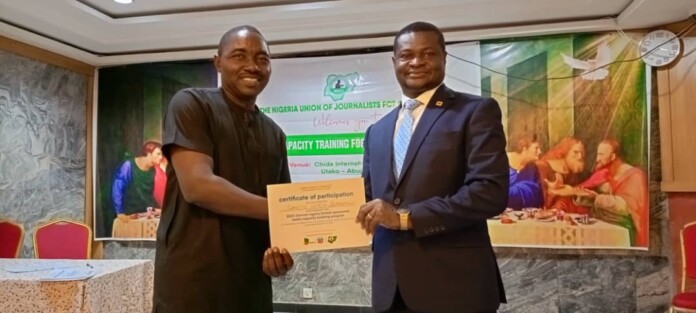Chairman, Nigeria Union of Journalists, NUJ, the Federal Capital Territory, FCT Council, Comrade Osaretin Osadebamwen receiving certificate of participation from the Manager, Corporate Communications of Chevron Nigeria Limited, Mr. Victor Anyaegbudike after the capacity training programme in Abuja.
*Organises capacity training for journalists
By Olugbenga Salami
Chevron Nigeria Limited, CNL, on Monday said it spends an average of over $1billion to support the Nigerian content development through employment and contract opportunities to Nigerians.
The General Manager, Policy, Government and Public Affairs, Mr. Esimaje Brikinn, who disclosed this at a one-day capacity building programme organised in conjunction with the Nigeria Union of Journalists, NUJ, Federal Capital Territory, FCT Council, in Abuja, said CNL gives priority to human investments that deliver long-term transformative.
The training covered like topics like the “Benefits of Social Media and Internet Influence on Media Development”, “Understanding Cyber Laws and Safety of Journalists in Nigeria”, and “Media in Developing Countries: Nigeria as Case Study.”
Brikinn, who was represented by the Manager, Corporate Communications in the company, Mr. Victor Anyaegbudike, added that CNL “contribute to the sustainable development of communities where we operate.”
He explained that this is being done through the Global Memorandum of Understanding, GMoU, a community-led participatory partnership model for community engagement and sustainable development pioneered by CNL in 2005.
“Since inception of the GMoU, CNL has contributed billions of naira to the Regional Development Committees, RDCs that represent the communities in its area of operations to execute hundreds of projects in the communities through a governance model that ensures transparency and accountability.
“Currently, we are working with the relevant government and community stakeholders to transit to the Host Community Development Trusts under the Petroleum Industry Act.
“Also, through Chevron’s Foundation for Partnership Initiatives in the Niger Delta, PIND, we are impacting hundreds of lives in the Niger Delta and supporting economic empowerment in the region,” he stressed.
Besides oil exploration and production, he added that CNL “is the highest contributor of high-quality domestic gas in Nigeria since 2015.”
“We are committed to lowering carbon emission and reducing gas flaring in Nigeria. Through investments in gathering and processing of associated gas, routine flaring has been reduced by over 97% in the past 10 years in CNL’s operations.
“Chevron’s vision is to be the global energy company most admired for its People, Partnership and Performance. We believe that energy is essential to modern life, and providing that energy is a profound responsibility. Our purpose is to develop the affordable, reliable, ever-cleaner energy that enables human progress around the world,” Brikinn explained.
He promised that the CNL would continue to partner with the media for the development of the society, stressing the need for capacity building of the media practitioners to enhance their capacity to perform their duties.
He said: “That is why CNL sponsors the Advanced Writing and Reporting Skills, AWARES programme in collaboration with the Pan Atlantic University, Lagos. Over 120 journalists have benefitted from the programme since its inception in 2014.
“Through programmes such as AWARES, we help to improve professional capacity and build lasting partnerships with our media stakeholders. We are also partnering with the Nigerian Union of Journalists (NUJ) to organize capacity building programmes that will involve an increasing number of journalists in Lagos, Asaba and Abuja before the end of this year.
“We also recognize that the success of the larger society invariably translates to success in our business; and we believe it is in our long-term interest to add value to society as we create value for our stakeholders.”
Earlier while welcoming participants to the training, the chairman of the NUJ FCT Council, Comrade Osaretin Osadebamwen, explained that the one-day capacity training programme intended to boost our capacities on the use of the media to spur national growth and development.
“This training has been long in coming. It is in continued fulfilment of our desire to explore all opportunities for capacity training programmes to our members. We may be a large pool of journalists, training, such as this, reduces the large number by our figure here in this hall.
“It underscores our desire to continue to improve and sharpen our skills under the fresh start mandate designed to equip us further in our daily tasks – understanding the influence of the new media in our duty to society,” he stressed.
Osadebamwen pointed out that journalists’ role as agenda setting agents for national development is and would never be lost to the media.
He, however, added that “the avalanche of online platforms and the broadcasting entities arising from the power of web 2.0, where content providers are serving various audiences with the claim of authenticity, the availability and access to manipulative apps sometimes makes disappear real.”
“All these call for the authentic. Our traditional platform becomes a ready source for verifiable news information.
“That hunger for true news sources has been one that has dominated the quest from the public on various platforms. This call, arises from the notoriety and penetration of fake news into the public space, the bigger brother, you would agree, to news distortion phenomenon misinformation, disinformation, mal-information and or propaganda,” the council chairman said.
Resource persons at the capacity training are Prof. Abiodun Adeniyi of Baze University, Abuja, who covered “Media in Developing Countries: Nigeria as Case Study”; Mr. Judd Okafor (“Benefits of Social Media and Internet Influence on Media Development”) and Mr. Adeyemi Adesomoju (“Understanding Cyber Laws and Safety of Journalists in Nigeria”).







